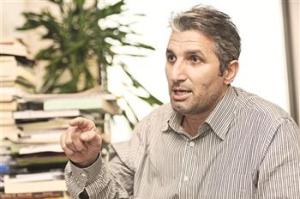ISTANBUL – Hürriyet Daily News
Vercihan Ziflioğlu vercihan.ziflioglu@hurriyet.com.tr
 The power struggle between Turkey’s ruling party and Islamic scholar Fethullah Gülen’s movement will not be stopped until one of them is brought down, prominent journalist Nedim Şener has said.
The power struggle between Turkey’s ruling party and Islamic scholar Fethullah Gülen’s movement will not be stopped until one of them is brought down, prominent journalist Nedim Şener has said.
Dozens, including three ministers’ sons, a mayor and a state bank CEO, were detained as part of a gripping bribery and corruption investigation that became public on Dec. 17, in what is believed to be another chapter in the clash between ruling Justice and Development Party (AKP) and the Gülen movement (Cemaat).
Following the investigation, the government shied from naming the Gülen movement, which has key members in Turkey’s justice and police system, but Prime Minister Recep Tayyip Erdoğan called it “a dirty operation” against his party and pointed the finger at “some circles inside and outside of Turkey.” Some pundits called the source of the operation as “a parallel state,” but Şener rejected the claim.
“This is not a parallel state, but there is a secret entity within the state. The prime minister is also part of this entity, so is the Gülen movement. The two sides share the power,” Şener said.
“This will not be an easy process,” the journalist said. “Either Cemaat will finish off the AKP, or the AKP will finish off them.”
Şener, the writer of a 2009 book titled “Fethullah Gülen and Cemaat in Ergenekon,” was arrested in 2011 as part of the case of the OdaTV, online news portal known for its fierce criticism of government policies. As part of the case, which started during the police’s Ergenekon coup plot case investigations, Şener and another prominent journalist, Ahmet Şık, spent a year behind bars under arrest, drawing criticism from public.
Şener claims his and Şık’s imprisonment were a result of the Gülen movement’s influence in the judiciary system, and that has also created a rift between the two sides.
Şener says the clash between the AKP and the Gülen movement emerged after a raid on the Mavi Marmara aid flotilla by Israeli soldiers in May 2010. It mounted with an investigation on the National Intelligence Organization (MİT) on Feb. 7, 2012, and blew into the open with the “dershane” crisis. The government wanted to close the private prep schools, called dershanes, many of which are owned by people with close links to the Gülen movement.
“The dershane row was just a trigger. This operation officially started the war between the AKP and the Cemaat,” Şener said. “The Gülen movement wants to finish off Erdoğan, because they want an AKP without Erdoğan. The Gülen movement wanted to have a word in power. So far, Gülen and the AKP had a ‘united fate,’ as they call it. Together they made many injustices and they are indebted to each other. Once, the prime minister said, ‘We gave them whatever they wanted.’ The prime minister should explain this.”
December/20/2013
